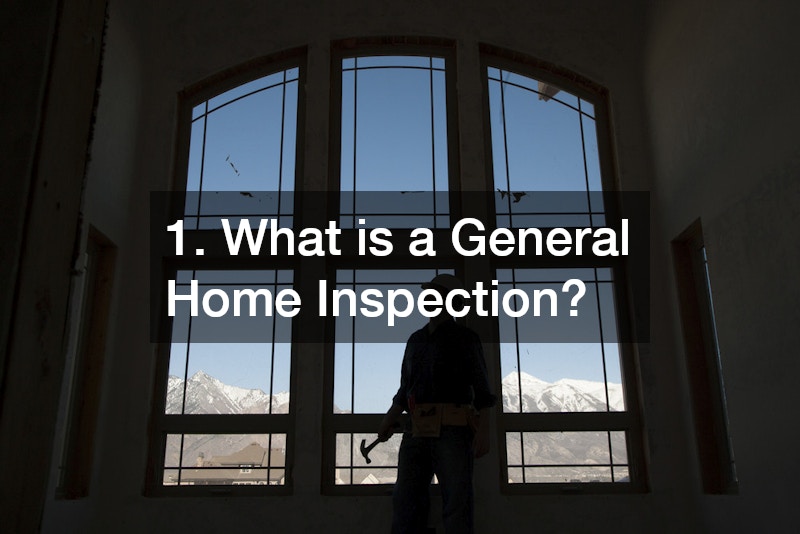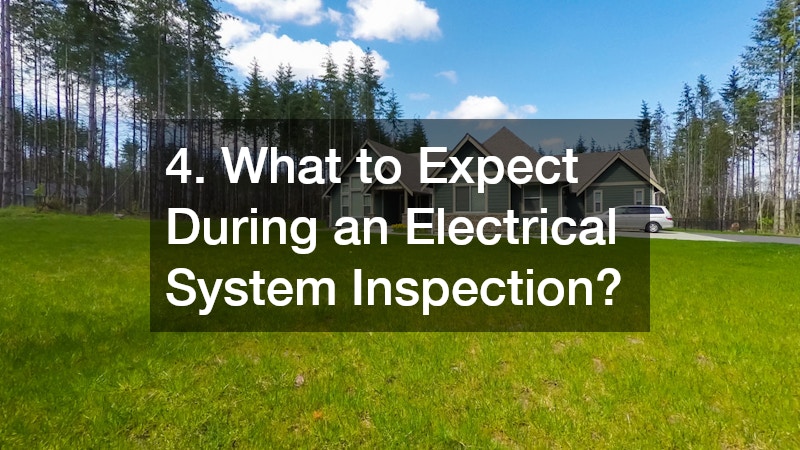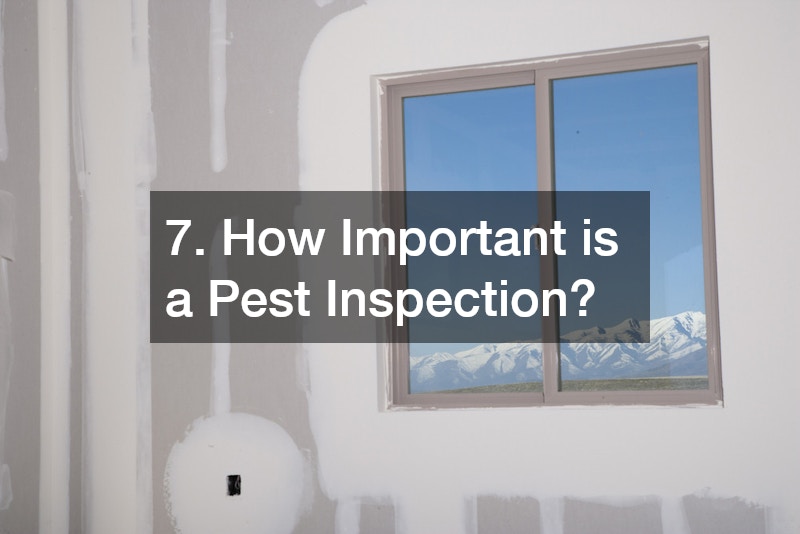
The journey of buying a home is exciting but also fraught with potential pitfalls. Understanding the importance of essential home inspections can save buyers significant effort and cost in the long run. To protect your investment, it is vital to examine various components of the property closely. These inspections are non-negotiable steps in the home-buying process, as they can reveal hidden issues that might not be apparent during a casual walkthrough.
This article covers ten crucial inspections every buyer should consider before finalizing a home purchase. Each inspection provides insight into specific areas of the home, ensuring the property is safe, up to code, and worth the investment. By the end of this article, you’ll understand why these checks are essential for any homebuyer.
1. What is a General Home Inspection?

A general home inspection is a comprehensive evaluation of a property, usually conducted by a certified professional. This inspection covers the overall condition of the home, from roofing to foundation, assessing many critical areas. Understanding this allows buyers to identify any potentially costly issues before they commit to purchasing the home.
A local paving contractor might be consulted if the inspection reveals issues with driveways or exterior paths, ensuring they are safe and durable. Exterior surfaces are often overlooked, but they play a crucial role in the property’s appeal and safety. As a buyer, hiring a local paving contractor after identifying such issues from a general home inspection can ensure a well-rounded and thorough review of the property.
General home inspections are integral because they can uncover visible and non-visible defects, such as structural damage, which may require hardscaping services. The inspector will provide a detailed report that helps buyers make informed decisions. Essential home inspections like these prevent surprises post-purchase and often save buyers from significant expense and stress.
2. Why is a Roof Inspection Necessary?
Roof inspections are critical, as the roof is one of the most vulnerable parts of a house. A compromised roof can lead to a slew of problems, from water damage to insulation issues. During this inspection, professionals will look for signs of damage, such as missing shingles or leaks.
Issues identified might necessitate hiring a pool contractor if there is water damage affecting leisure areas. Water pooling can cause damage not only to interiors but also to areas like decks and patios. Even minor roof damage should be carefully assessed to prevent future, financially draining repairs.
Completing a roof inspection can potentially save a buyer from costs associated with severe weather and aging materials. It offers peace of mind knowing that the structure has been evaluated by a trusted professional. For these reasons, essential home inspections like roof evaluations should never be overlooked.
3. How Does a Plumbing Inspection Work?
Essential home inspections must include a comprehensive plumbing inspection, which checks for leaks, corrosion, and the proper functioning of the system. Unlike straightforward visual checks, professional plumbing services involve thorough diagnostics to detect hidden issues. Catching these potential problems early in the buying process can prevent costly repairs later.
Hiring an ac repairs and installation professional can be part of ensuring the plumbing components tied to HVAC systems are functioning correctly. This integration is crucial as any failures in the system can lead to poor air quality and water leaks, both damaging to the home environment. Ensuring these systems work harmoniously is vital in protecting the buyer’s investment.
Addressing plumbing issues before purchase can prevent things like water wastage and serious structural damage. Inspectors traditionally check everything from the water heater to each pipe joint. These necessary evaluations make plumbing inspections a key consideration in essential home inspections.
4. What to Expect During an Electrical System Inspection?

An electrical system inspection is one of the most critical components of essential home inspections, as it directly relates to both safety and long-term functionality. Inspectors carefully examine the home’s wiring, outlets, circuit breakers, and fixtures to ensure they comply with current building codes. Outdated systems such as knob-and-tube or aluminum wiring can pose serious fire hazards, while overloaded circuits may result in frequent power outages. Even minor issues, like loose outlets or flickering lights, can signal deeper concerns that, if left unchecked, could lead to costly repairs or dangerous accidents.
In many older homes, plumbing and electrical systems often run side by side in basements, crawl spaces, or utility rooms. This is why coordinating with a plumbing service can be advantageous if upgrades are required. For example, installing new electrical wiring may also present an opportunity to replace aging water lines or improve drainage systems in the same area, saving both time and labor costs.
A detailed inspection provides buyers with a clear roadmap of necessary improvements, whether it’s a complete rewiring project or the replacement of a few outdated fixtures. Understanding these findings empowers buyers to make informed decisions, negotiate repair credits, or budget for future upgrades—making electrical inspections indispensable in the home-buying process.
5. Why Schedule a HVAC System Inspection?
HVAC systems play a central role in creating a safe and comfortable living environment, making their inspection one of the most important aspects of any essential home evaluation. Heating and cooling units that appear functional on the surface may harbor hidden issues such as clogged filters, leaky ducts, or outdated components that no longer perform efficiently. Without a detailed inspection, buyers may inherit systems that drive up monthly energy bills or fail when needed most during extreme weather. Identifying these problems early allows for informed negotiations and prevents future financial strain.
Outdoor elements also influence HVAC efficiency. For example, if an outdoor AC unit is installed near post and rail fencing or landscaping features, airflow could be obstructed, reducing system performance. Inspectors evaluate whether the unit has sufficient clearance, is level, and is protected from excessive debris or pest intrusion. These external factors, while easy to overlook, are vital in maintaining long-term system reliability.
Routine HVAC inspections provide a roadmap for both immediate repairs and long-term maintenance. By recognizing the need for ac repairs or a full installation ahead of time, homeowners can budget accordingly. Including HVAC checks in essential home inspections ensures year-round comfort, improved energy efficiency, and peace of mind for future residents.
6. What Role Do Foundation Inspections Play?
The foundation of a home literally supports everything above it, and ensuring its stability is paramount. A foundation inspection can reveal cracks or shifts that endanger the structural integrity of the house. Such problems can affect everything from doors not closing properly to severe property hazards.
Hardscaping services may be recommended if landscape elements are negatively impacting the foundation. Improper drainage or structural encroachments by surrounding features need evaluation and correction. Identifying these areas during an inspection allows buyers to negotiate repairs before finalizing a sale.
Essential home inspections that include foundation scrutiny provide a detailed account of potential risks and long-term maintenance needs. Receiving a clean report ensures buyers that the house is on solid ground—literally and metaphorically. This assurance is fundamental in protecting the homebuyer’s investment.
7. How Important is a Pest Inspection?

Pest inspections, though often overlooked, are one of the most critical components of safeguarding a property, especially in regions prone to infestations. Termites, carpenter ants, rodents, and other pests can cause extensive structural and electrical damage, often hidden behind walls or beneath flooring. Left untreated, these issues may lead to thousands of dollars in repairs and even compromise the safety of the home. By including pest evaluations as part of essential home inspections, buyers and homeowners gain the advantage of early detection, which allows for immediate and less costly remediation before problems spiral out of control.
A common factor behind recurring infestations is inadequate or poorly installed insulation services. Gaps, cracks, or degraded materials can create entry points and comfortable nesting environments for pests. When professionals combine pest inspections with insulation assessments, homeowners gain dual benefits: improved energy efficiency and stronger protection against unwanted intruders. This holistic approach not only reduces heating and cooling costs but also shields the property from long-term pest-related damage.
Ultimately, pest inspections provide peace of mind. They confirm that a property is safe, healthy, and structurally sound, while also offering tailored recommendations for ongoing maintenance. For a prudent homebuyer, prioritizing pest checks is a wise and non-negotiable investment.
8. Should I Invest in a Mold Inspection?
A mold inspection reveals hidden dangers that can affect health as well as property value. Moisture-related issues, often unseen, can foster mold spores that lead to respiratory problems, allergies, and even long-term health complications for sensitive individuals. Left unchecked, mold can also compromise structural materials such as drywall, wood, and insulation, leading to costly repairs. Essential home inspections should, therefore, always include a specialized mold review to uncover issues that may not be visible to the naked eye.
This inspection often reveals the need for foundation services if ground moisture is a key contributor to mold growth. Cracks in the foundation, poor drainage, or inadequate waterproofing can all create the perfect environment for mold to thrive. Addressing these underlying contributors not only combats current issues but also prevents future recurrences. A thorough analysis allows peace of mind, knowing your living environment is safe, secure, and resilient against hidden moisture damage.
Mold problems can drastically lower a property’s value and appeal, making it harder to sell and less attractive to potential buyers. Professional intervention ensures remediation is done correctly, protecting both health and investment. Prioritizing mold checks within essential home inspections is a wise, proactive step for any cautious buyer.
9. What is the Importance of a Septic System Inspection?
For homes relying on septic systems, an inspection ensures everything functions optimally without overflow or blockage. Professionals assess the condition of the tank, its components, and perimeter, gauging performance and expected lifespan. Critical insights like these are a vital part of essential home inspections, as they provide buyers with a clear understanding of the system’s overall health.
Chimney services might need to be evaluated concurrently if fumes or by-products directly affect the living area. Proper ventilation and system placement are crucial in ensuring both systems work harmoniously. Addressing these components together aids in maintaining a balanced internal environment while protecting residents from harmful exposure.
Poorly maintained septic systems can lead to health hazards, expensive repairs, and environmental damage. Thus, their inspection highlights the importance of regular maintenance and clearances. In many cases, inspectors also check for tree root intrusions, drainage field issues, or structural weaknesses. Buyers informed through these detailed reports can confidently finalize their purchase, knowing they have a reliable foundation for safe, long-term homeownership.
10. How Does a Chimney Inspection Protect Homebuyers?

A chimney inspection safeguards homebuyers by ensuring safe operation and structural integrity. The chimney’s interior and exterior are checked for blockages, cracks, and overall condition. With many potential risks associated with chimney defects, this essential home inspection is particularly important for properties with active fireplaces.
Engaging a deck contractor may be necessary if exterior aesthetics or structural compatibility impact the overall home value. Deck areas contributing to chimney support need equal attention and evaluation. Inspecting these parts ensures comprehensive coverage of vital home aspects.
Chimney inspections not only uncover safety hazards but often result in enhanced system performance. Proper cleaning and structural adjustments guarantee benefits that last well into the home’s future. For conscientious buyers, this inspection is key in their essential home review process.
Scheduling these 10 essential home inspections can provide peace of mind and protect your investment when purchasing a home. They not only reveal potential problems but also guide necessary improvements, ensuring your new home is safe, efficient, and in good repair. Understanding and conducting these checks can make all the difference in securing a property that truly meets your needs for years to come.
Each inspection highlights a critical aspect of home ownership, bringing potential issues to light before they become costly problems. By engaging reputable professionals, homebuyers gain confidence in their purchase and become informed decision-makers. Consequently, comprehensive essential home inspections remain an indispensable tool on the path to homeownership.